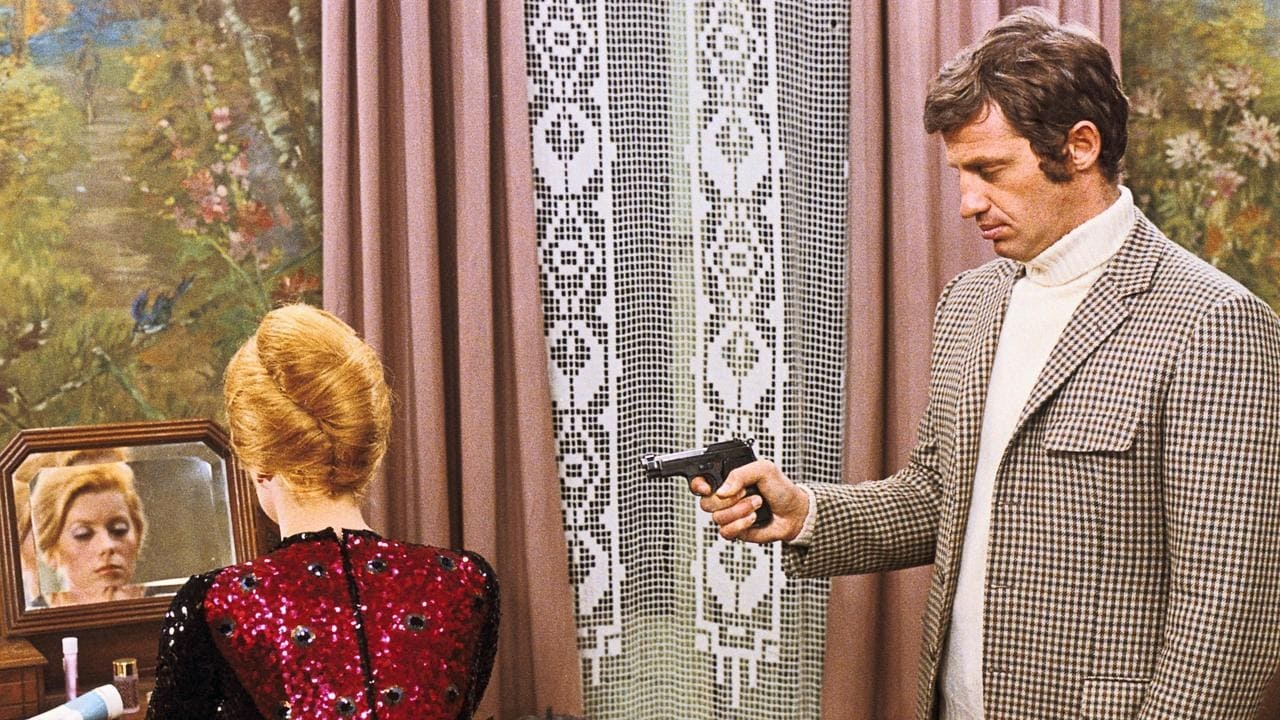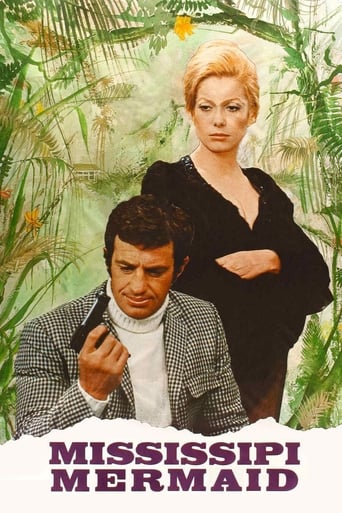

On the surface, Francois Truffaut's Mississippi Mermaid is a taut, well- made Hitchcockian thriller that features good looking actors (including the alluring, icy blonde), exciting chases and bizarre circumstances. However, Truffaut gives the story his own twist by focusing on the characteristic of obsession and how it claws at the protagonist and affects his judgment. Jean-Paul Belmondo puts aside his typical suave and cool demeanor to play a wealthy but lonely and somewhat naive tobacco plantation owner who puts in a request for a mail-order bride, only to discover that she looks like Catherine Deneuve. Naturally, he is taken under her spell and soon discovers she is much more duplicitous than he expected. Many film lovers may know this story better as it was remade in 2001 with Antonio Banderas and Angelina Jolie as Original Sin. Despite having not seen that film, I am confident it cannot be better than this version for two reasons. First of all, Truffaut is a much better director, able to seemingly tie all these various strings together into a coherent and plausible story. Second, there is no way Banderas and Jolie could match the sizzling chemistry between Belmondo and Deneuve. They are capable of being remarkably sexy and sultry without resorting to complete nakedness. This is a sign of true thespian abilities. While not one of Truffaut's stronger works such as his Antoine Doinel series or Jules and Jim, it is still an entertaining romantic thriller that manages to be both romantic and thrilling. Given the status of many of these types of films recently, there is plenty of reason to revisit this New Wave example.
... View MoreI am surprised that nobody has yet pointed out that the ending in the snow is an homage to Jean Renoir's "Grand Illusion." The film is dedicated at the beginning to Renoir.Jean Renoir was the great humanist director. For him, all that matters is how we treat human beings. The same here for Truffaut. The film tells us that it does not matter if you're rich or poor, male or female, upholding the law or fighting it, the only thing that matters is love. This is a romantic film that has occasional touches of a good mystery/detective/noir film. The Hitchcock film that it most reminded me of was "Marnie". There, like here, it is hard to know if crime or patient love will win out in the end.I did not care much for the New Wave style editing, which seemed out of sync with the dramatic story at times. The many shots of Belmondo driving kept reminding me of the beginning of "Breathless." The color seemed a bit dull and washed out.The locations are lovely, but Truffaut seems to have only one thing on his mind, the relationship between the lead characters, Louis and Juli/Marion. The characters and the audience think they know each other, but the film keeps fooling them and us. We are constantly getting new information that makes us re-evaluate who they are and they are constantly surprising each other. For example, Louis has been telling Juli/Marion how much he loves her and how beautiful she is and then suddenly he gets upset and tells her how there are many of her kind - she is not really a woman or a girl, but a "chick". The term "chick" is far more demeaning here then the term "bitch" or "slut" could ever have been. He tells her that her cold attitude actually makes her ugly. Watching the scene, one thinks about how easily and naturally men can degrade women, even women they love.The film is a bit long and occasionally meanders, but it is emotionally intense at many points along the way. It seems that nothing is happening and then suddenly there's a surprise that makes you think, "Oh my goodness, I didn't expect that." It may not be one of Truffaut's best films, but second-rate Truffaut is still better than 90% of other directors' best stuff.
... View More"Julie, you are adorable," says Louis Mahe (Jean-Paul Belmondo) to his beautiful new mail- order bride, Julie Rousel (Catherine Deneuve). "Do you know what that means? 'Adorable'. It means worthy of adoration." Louis is a wealthy tobacco grower and cigarette manufacturer on the French island of Reunion in the Indian Ocean. When Julie arrived on the island, she didn't look like the photograph she had sent him when she agreed to be his wife. She says she was timid and decided to send the photograph of her sister. Louis is enchanted by her beauty and understands her caution. They marry, and Louis becomes a husband deeply happy. He tells her she is worthy of adoration just a day or two after he arranges to change his personal and business accounts into joint accounts. That evening, Julie has disappeared, cleaning out both accounts. Louis goes to France, has a breakdown, and then by chance sees Julie in a newscast about a new nightclub and the women there who are hostesses. Louis learns she is really a woman named Marion Vergano. Marion's history would lead only the most obsessed of men to think a happy ending could be in the cards. Most of the movie places us in France after Louis has found her and accepted her as Marion Vergano Mississippi Mermaid, written and directed by Francois Truffaut, is a movie of Louis' obsession, of sexual psychosis, of parasitic selfishness, of stolen identity and of rat poison, with a lot of self-revealing (some of it even true) dialog thrown in. As much as I think comparing one director to another is usually pointless, in this case Truffaut may have watched Vertigo, Psycho and Marnie once too often. Still, murder at the top of the stairs, the star power of Deneuve and Belmondo and some eccentric passing opinions (Louis thinks Johnny Guitar is "a love story, with lots of feeling in it."), all handled with Truffaut's characteristic confidence isn't something to pass by. The downside is that Mississippi Mermaid, despite all of its advantages, at times veers too close to melodramatic parody. "You mustn't cry, my dear. It's your happiness I want, not your tears." "I'm learning what love is, Louis. It's painful. It hurts me." It sounds better in French, but the meaning is just as soppy. Truffaut adapted his movie from the pulp mystery novel, Waltz into Darkness, by Cornell Woolrich writing as William Irish. The movie didn't do too well the first time out, but then underwent a rediscovery of sorts. Unfortunately, that meant articles by people who teach film studies at universities. One such person wrote, Mississippi Mermaid "remains a fascinating exploration of the major themes essayed by movie melodramas of betrayal - a sort of distillation of the amoral nucleus of Double Indemnity and the wilder settings of Key Largo." Distillation of the amoral nucleus? I don't even know what an amoral nucleus is. The salient point, for me, is that films such as Double Indemnity and Key Largo are above all else tightly told stories. I think Truffaut with Mississippi Mermaid started with a nice, nasty, obsessional pulp tale, but then tried to do too much with it.
... View MoreIn Reunion Island in the Indian Ocean, the owner of a cigarette factory Louis Mahé (Jean-Paul Belmondo) is engaged through correspondence with Julie Roussel and he does not know her. When Julie arrives in the island to get married with Louis, he waits for her in the docks but Louis does not recognize Julie in the passenger vessel and finds that she is totally different from the picture she had sent to Louis. They get married and Louis shares his bank accounts with her. When Julie's sister writes a letter to Louis asking her sister to write to her, Louis discovers that the woman is not Julie that is missing. Further, he finds that the woman has cleared his bank accounts and left the island. Louis and Julie's sister hire an efficient private detective Comolli (Michel Bouquet) and Louis travels to France seeking the woman, but he has a nervous breakdown in Nice and is submitted to an intense sleeping therapy in a clinic. He recovers and finds that the woman, actually Marion Vergano (Catherine Deneuve), works in the Phoenix Club Privé in Antibes and lives in the low-budget Monorail Hotel. Louis breaks in her room and when she arrives from the club, she tells that she was happy with him but her former dangerous lover Richard had blackmailed her. Louis is still in love with Marion and escapes with her to the countryside. But Comolli is chasing Marion in France accused of murdering Julie."La Sirène du Mississipi" is a film-noir by the great director/writer François Truffaut, with an unconventional love story of passion, murder and love that hurts. The femme fatale Catherine Deneuve is astonishing, probably in the top of her beauty and is delightful to see her face and the topless scenes on the road and in the room. Jean-Paul Belmondo is very athletic, and the sequence when he escalates the wall of the hotel is impressive. Catherine Deneuve makes this film worth and gives credibility to the passion and lust of Louis. My vote is eight.Title (Brazil): "A Sereia do Mississipi" ("The Mississippi Mermaid")
... View More